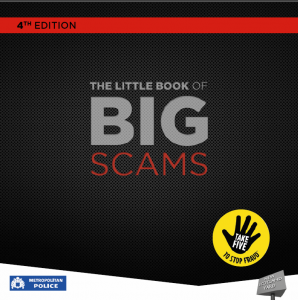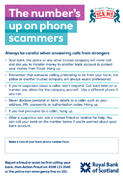 Apart from thinking (regularly!) about BMS funding, premises and leases, and taking the occasional bike ride, we are also starting to think about future activities that the Banchory Men’s Shed can offer, and one that has come up a number of times is to run classes to help people with IT and Computer / Tablet / Smartphone use – both BMS members and the wider Banchory community. But we needn’t wait for such classes in order to help you avoid being scammed out of your money. Please read on…
Apart from thinking (regularly!) about BMS funding, premises and leases, and taking the occasional bike ride, we are also starting to think about future activities that the Banchory Men’s Shed can offer, and one that has come up a number of times is to run classes to help people with IT and Computer / Tablet / Smartphone use – both BMS members and the wider Banchory community. But we needn’t wait for such classes in order to help you avoid being scammed out of your money. Please read on…
You may have seen in the P&J yesterday an article about a Deeside Postie and his mother who were scammed out of £80,000. This is devastating for them and we hope they get somewhere with recovering the money. But are you thinking “It couldn’t happen to me”? Well, before you think that, read this article from the Telegraph some years back. Any of that sound familiar to you? Are you sure you would spot the problem? And what if the line the scammers are spouting happens to coincide with something that has actually happened to you recently – like an actual card loss or a previous problem with your bank – and they therefore catch you with your guard already half down? You could be taken in.
But, you say, surely your bank will protect you against such losses? No, often not, especially if you have allowed yourself to give out legitimate transaction details to a scammer.
So, what to do and what not to do?
Prepare – do your homework
Each bank web site will have its own security advice – go and read it and take note.
Some of the information the banks present can however be quite complex and even tiresome to wade through. We suggest you read the excellent Little Book of Big Scams (downloads .pdf document) published by a number of Police Forces. This is a nice concise summary of pretty much everything the scammer can get up to, and the ways they can fool you. It covers not only banking fraud but also computer “servicing” fraud, courier and door-to-door fraud and so forth. Print it in booklet form, if your printer can do this, and keep it handy.
 Also print out some basic rules and keep them next to your phone – either write them out yourself as you will remember best that way, or the RBS Phone Scam Sheet is one ready-made example.
Also print out some basic rules and keep them next to your phone – either write them out yourself as you will remember best that way, or the RBS Phone Scam Sheet is one ready-made example.
And if the phone rings…
Stay Mindful
Remember – you are in control – there is nothing they can do if you keep your details to yourself.
If they use your correct name, it is no guarantee they are legitimate, but it can start to get beneath your defences.
They will try and get you “on edge” and not thinking straight by saying that you have possibly already suffered a loss. That is almost certainly not the case, but even if it were, now is the time to say that you will call the bank’s fraud line back to check. Simply hang up. Wait a while, find your equilibrium, get the bank’s number from a legitimate source and call them preferably from another phone (a mobile, or a neighbour’s). The fraudsters could still be on the line to your own phone even though you might dial a correct number, simply by them not hanging up in the first place – that’s how the UK phone system works.
And finally
We’ve only covered the one sort of scam here – but do read the Little Book of Scams and stay on your guard. And if you know someone who perhaps doesn’t have good internet access or might somehow be vulnerable, perhaps print them a copy, too.
